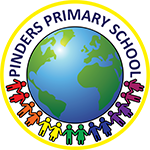EYFS
Statutory Programme of Study for EYFS – Literacy
It is crucial for children to develop a life-long love of reading. Reading consists of two dimensions: language comprehension and word reading. Language comprehension (necessary for both reading and writing) starts from birth. It only develops when adults talk with children about the world around them and the books (stories and non-fiction) they read with them, and enjoy rhymes, poems and songs together. Skilled word reading, taught later, involves both the speedy working out of the pronunciation of unfamiliar printed words (decoding) and the speedy recognition of familiar printed words. Writing involves transcription (spelling and handwriting) and composition (articulating ideas and structuring them in speech, before writing).
At Pinders Primary we use Development Matters to help support our Reading curriculum.
Development Matters:
Nursery – 3 and 4 years old will be learning to:
Understand the five key concepts about print:
- print has meaning
- Print can have different purposes
- We read English text from left to right and from top to bottom
- The names of the different parts of a book
- Page sequencing
Develop their phonological awareness, so that they can:
- Spot and suggest rhymes
- Count or clap syllables in a word
- Recognise words with the same initial sound, such as money and mother
Engage in extended conversations about stories, learning new vocabulary.
Children in Reception will be learning to:
Read individual letters by saying the sounds for them.
Blend sounds into words, so that they can read short words made up of known letter– sound correspondences.
Read some letter groups that each represent one sound and say sounds for them.
Read a few common exception words matched to the school’s phonic programme.
Read simple phrases and sentences made up of words with known letter–sound correspondences and, where necessary, a few exception words.
Re-read these books to build up their confidence in word reading, their fluency and their understanding and enjoyment.
Re-read what they have written to check that it makes sense.
Literacy ELG: Comprehension
Children at the expected level of development will: - Demonstrate understanding of what has been read to them by retelling stories and narratives using their own words and recently introduced vocabulary; - Anticipate – where appropriate – key events in stories; - Use and understand recently introduced vocabulary during discussions about stories, non-fiction, rhymes and poems and during role-play.
ELG: Word Reading
Children at the expected level of development will: - Say a sound for each letter in the alphabet and at least 10 digraphs; - Read words consistent with their phonic knowledge by sound-blending; - Read aloud simple sentences and books that are consistent with their phonic knowledge, including some common exception words.
